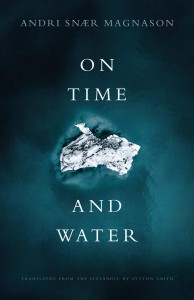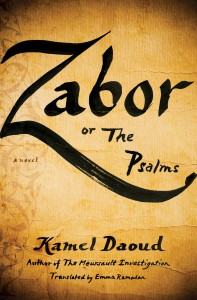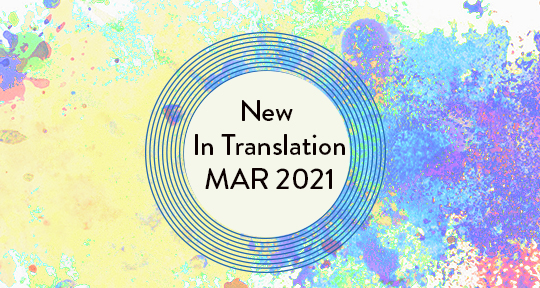This month, our selection of excellent new publications are representative of literature’s capacity for translating worldly phenomenon into language, converting the lived into the understood. From Iceland, a passionate and intimate call to response on the tragedies of environmental destruction; from Palestine, a monumental work of love and resistance from “the Virginia Woolf of Palestine,” Sahar Kalifeh; from Algeria, a sensual novel that treads the tenuous territory of colonialism’s aftereffects; and from Japan, the English-language debut of Akutagawa-winner Kikuko Tsumura, who with graceful humour and intrigue tackles the toxic concept of labour in the thrive of capitalism.

On Time and Water by Andri Snær Magnason, translated from the Icelandic by Lytton Smith, Open Letter, 2021
Review by Rachel Farmer, Chief Executive Assistant
When Greta Thunberg addressed the UN Climate Summit in September 2019, she choked back tears as she uttered the now infamous words: “How dare you?” Reactions to this display of emotion were mixed to say the least. Some showed discomfort, others concern for her wellbeing; some dismissed her outburst as manipulative, others ridiculed her. Her face and words were even immortalised in meme format. In displaying her anguish and rage so plainly, Thunberg violated the unspoken rule that seems to underpin much of the communication and discussion around climate change, wherein impassivity, stoicism, and detachment reign supreme.
In On Time and Water—part memoir, part interview, part impassioned treatise on the future of our planet—Andri Snær Magnason follows the young Swedish activist’s example, casting aside convention and delving into the emotional side of the climate crisis. In doing so, he embarks on a deeply humane and vulnerable exploration of what manmade climate change truly means for the planet—and for us. In this compelling hybrid of a book, translated sensitively by Lytton Smith, he explains how, a few years ago, he was called upon to defend a region in his country’s highlands from being destroyed in the name of energy production. Despite his deep admiration for the spiritual fervour with which Helgi Valtýsson, another Icelandic writer, wrote about the region in 1945, Magnason found himself unable to infuse the same passion into his defence. Bringing emotions into the discussion would have risked his arguments being dismissed as hysterical, doommongering, or hopelessly idealistic.
I’d found myself overwhelmed by melancholy at the unruly devastation that washed out this peerless region, yet I chose words that seemed moderate and inviting to readers. I used the prevailing language of liberalism, innovation, utilitarianism, and marketing. I discussed the area’s importance for Iceland’s image, its potential tourist income, the area’s research value, how the highlands were a magnet for foreign currency as a filming location for movies or commercials. [. . .] We live in times when money is the measure of reality. I couldn’t argue nature’s right to exist, its essential value, by saying that we might find God’s all-encompassing expanse there.
In a way, On Time and Water could read as a protest—an act of defiance against the emotionally barren landscape of climate rhetoric. Magnason tempered his defence of the unspoiled beauty of the highlands in an attempt to appeal to the conventions of popular discourse, yet this did not stop the area being destroyed forever in the name of a few cheap megawatts. To him, this example of ecological destruction for economic gain represents a microcosm of how humanity is treating the planet as a whole. The Earth is seen as nothing more than a resource driving endless economic growth rather than the unique and precious home—the only home—of the human race, a place worthy of protection in its own right.
Perhaps, Magnason hypothesises, this lack of emotion when discussing global warming, this reluctance by scientists to infuse the words they use with the full force of their meaning, is hampering our ability to connect with the subject and grasp what is truly happening—and what is at stake. But to comprehend such an unfathomable topic is no easy task. Magnason compares the subject of climate change—impenetrable in its enormity—to a black hole. It is impossible to look at a black hole directly; instead, scientists must look past it to the stars nearby. Similarly, the sheer magnitude of the statistics surrounding climate change and the true meanings behind them are so vast that they lose all meaning to the average person.
Yet it is not merely the scale of the problem that is the source of our bewilderment, but also the predominant ideas of our current time. “People live inside their own realities, locked in the prevailing language and power systems of their contemporary moment.” This is the ultimate paradox when it comes to conveying the true enormity of the climate crisis. As Magnason points out, people in the 1930s would hardly have comprehended the word “holocaust,” a word which now carries the connotation of indescribable horrors. Imagine if the words “global warming” and “ocean acidification” carried the same weight, the same power to terrify as the words “nuclear winter,” “invasion,” or, indeed, “virus.” Perhaps it is impossible for us to wrap our heads around the true significance of these words until we have witnessed with our own eyes the dire consequences wrought by the phenomena they describe—by which time it will be too late.
The main thrust of the book may be an impassioned defence of our planet, yet it is so much more than that. The author muses on the fascinating lives of his relatives: his grandfather, the famous surgeon who operated on the inventor of the atomic bomb; his other grandparents, the amateur glaciologists who roamed an icy habitat likely to vanish within his own children’s lifetimes; his uncle, the crocodilian enthusiast who helped save several species from the brink of extinction. He also explores the curious similarities of the Icelandic and Hindu creation myths, interviews the fourteenth Dalai Lama, and offers his own cautiously optimistic meditations on humanity’s capacity (when it is motivated enough) to enact change with admirable rapidity.
It is difficult to express to someone who has not read it how wonderful and how horrifying—in a nutshell, how truly vital—this book is. Magnason has created a masterpiece, staunchly scientific and highly informative, yet utterly raw in its humanity. He marvels at the cruelty and destruction we have wrought, his lyrical prose a passionate plea to preserve as much of our unearned paradise as possible for future generations. And through all this, he does not shy away from speaking with almost spiritual reverence about the unequivocal, inalienable sanctity of mother nature.
Read this unforgettable book to understand the enormity of the task ahead of us, and to have your mind—and heart—irrevocably changed.

My First and Only Love by Sahar Khalifeh, translated from the Arabic by Aida Bamia, Hoopoe, 2021
Review by Carol Khoury, Editor-at-Large for Palestine
We all know that we should not judge a book by its cover—but what if the cover was brilliant enough to give an accurate impression of the book, or even the author’s whole project? In My First and Only Love, the cover takes full advantage of its expressive potentialities, doing so not by the pleasant pistachio-green background colour, nor by the intricate drawing, not even by the many imbedded symbols, but in the quotation at the top: “Sahar Khalifeh is the Virginia Woolf of Palestinian literature.”
Khalifeh is indeed considered to be one of Palestine’s leading (female) novelists, but the comparison to Virginia Woolf comes for a reason: according to The Literary Encyclopedia, “Khalifeh has an acute eye for exposing the problems of contemporary Palestinian society under [Israeli] occupation, including its treatment of women.” As flattering as that delineation may be, it has also come with a price—a high one. When the book first appeared in Arabic in 2010 to loud applause, it also revived a heated wave of accusations of Khalifeh being a feminist chauvinist. Such attacks were not new to Khalifeh—she has known them since the publication of her first novel in 1974. “I am a writer of resistance on the various types of emancipations,” is her usual answer. In a verbal clash with Emile Habibi (1922–1996)—the sharp-tongued Israeli-Arab writer and politician—back in the seventies in her own house in Ramallah, she threw a boiled egg at him and said: “the weak body cannot resist diseases. If we seek resistance, we must first resist ourselves so that we endure and triumph.”
Khalifeh’s novels project has been totally linked to the Palestinian cause. In her own words:
My rejection of injustice in all its forms made me a prisoner of my miserable political reality as a defeated Palestinian, and as an Arab woman surrounded and bound by countless restrictions . . . As you know, we only write what we know, what we feel, and what we dream. What I know, feel, and dream of so far has not been achieved, so I am in a cycle, and in conflict, and in constant fighting with my frustration. This is reflected in my writings, personalities, and opinions . . . I am a product of this reality, and escaping from it is very difficult, even impossible. This is why my writings were a reflection of this reality, or more precisely, an attempt to explore its delicacies and details. I am still working on understanding it, on deconstructing it for the sake of salvation and transcendence. I’m still trying so far.
Sahar Khalifeh established her novel project on the dichotomy of the woman/the homeland, where there is no way to liberate the homeland without a free man who recognizes the existence of a woman without conditions. Faisal Darraj, a Palestinian literary and cultural critic and an authority when it comes to Palestinian literature, praises Khalifeh for being able to closely link the national struggle movement with the women’s liberation movement in Palestine. To him, My First and Only Love is one of the best-written novels by Palestinian novelists after the pioneers’ generation.
The novel depicts a part of a tragic epic that has lasted more than sixty years, confirming that history is what we write, not what we hide away in boxes. Through a deeply poetic account of love and resistance through a young girl’s eyes, the novelist communicates her conceptualization of the revolution—like first love—as a beautiful dream-state that was abruptly terminated upon its collision with reality, but is neither effaced then nor in the days to come. In the midst of a political reality that imposes a state of despair, and a moral reality that prompts incitement, the reality must be abolished and morals preserved, so the novel grows in steadfast passions which refuse to surrender, despite a ruined political reality. It is a novel that removes the reader from a world dominated by ideology and partisan stances, into a lauding of heroism and human bravery; it sings the praises of the championship of ordinary citizens, especially during times of prevailing frustration. The story remains optimistic, in its content and its national and humanitarian mission.
I wanted to link the private and the public, with the past and the present. I do that in my capacity as a political novelist, one who has a cause to fight for. I’m shedding light on the martyr Abdul Qadir al-Husseini and his neglected heroics, for the new generation to know that time did not skimp on giving us great personalities.
Khalifeh’s narrative style is sensitive, thrifty, and transparent. Although she writes in standard Arabic, she has a wonderful ability to borrow from the Palestinian colloquial and its vernacular expressions as the dialogue in the novels necessitates. The women in this novel emerged and interacted with reality in an active way. As usual, Khalifeh sets her aesthetic standards different from the prevailing depictions that portray women as beautiful on the outside and weak on the inside.
On her part, the translator Aida Bamia shares her feelings on why My First and Only Love was such an emotional translation experience, saying:
. . . the difficulty was on an emotional level for me as a Palestinian who as a child living in Jerusalem and watching the concern and worry of my family for our safety and hearing stories of explosions and bloody encounters with Jewish and British troops—it was a traumatizing period. This novel was the most emotional for me to translate, as it also marked the end of a comfortable childhood for me and my siblings, and the beginning of a life in exile.
As this lovely novel comes out in March, one can imagine the joy Sahar Khalifeh is living knowing that International Women’s Month is acknowledging the work of three women: herself, the translator, and Najat El-Taji El-Khairy, the cover artist. Well done, Hoopoe!

Zabor, or the Psalms by Kamel Daoud, translated from the French by Emma Ramadan, Other Press, 2021
Review by Alice Banks, Copyeditor
“Writing is the only effective ruse against death,” our narrator Zabor pens in his opening lines. Zabor—Arabic for “psalms”—is the first word that left Ishmael’s mouth, and later became the name he gave himself. A troubled soul and a haunted man, he believes that he has been given the gift of writing to keep the living alive and to save the dying from death. For years, Zabor’s gift has tied him to his small village of Aboukir in Algeria, a place built upon memories of colonization and religious politics—memories that manifest in Zabor’s frantic writing, which preserves and heals his village and its inhabitants. This gift, however, soon becomes a burden when Zabor is reluctantly recruited by his half-brothers in a last attempt to save his dying father, who cruelly abandoned Zabor as a baby, and with whom he has since had a distant, cold, and hateful relationship.
Zabor, or the Psalms is an exhilarating novel, a saga, a journey through literature, language, and postcolonialism. As the spiraling and lyrical prose proceeds, it becomes clear that Kamel Daoud did not intend for this novel to be straightforward. Daoud—in Ramadan’s exquisite translation—makes the reader work, immersing them deep into Zabor’s plagued mind and troubled thoughts on language, literature, and his gift. I can only imagine the huge challenge that Ramadan has conquered in translating this incredibly lyrical prose that jumps back and forth between times, flits between thoughts, and sits upon layers and layers of metaphor. Her translation is impeccable, allowing the reader to easily immerse themselves into Zabor’s strange world. The text explores themes of rejection, abandonment, isolation, and death, but most importantly, Daoud subtly unpicks the power of language and literature in a postcolonial setting, presenting these charged topics through the lens of filial piety.
Abandoned by his father, orphaned by his mother, and taken in by his spinster aunt, Zabor was a feeble and anxious child who only found solace in words, with writing bringing him strength and reading offering him comfort. This strength and comfort, however, did not come easily, and Zabor’s initial encounters with language were fraught, confusing, and disorientating. Throughout his childhood, Zabor discovers just how charged language can be, and this unbalanced coalescence of languages, along with their underlying sociological and political issues, proves too much for the child to handle, resulting in a sickness that culminates in fainting spells, panic attacks, and night terrors. His sickness, however, soon subsides when one fateful day, he discovers the language of his gift: French.
Zabor’s discovery of the colonizer’s language is sensual, exquisite, and opens him up to a whole new world of “ecstasy.” French—new and covertly explored—produces a strange sense of shame in Zabor, and he inherently links this “erotic” language to his adolescent body and the changes it is experiencing. Zabor describes these clandestine readings of French as “chaotic [. . .], shameful and splendid like the nocturnal embrace of infidelity,” and is struck by the power and liberation that this language seems to hold:
[T]his was the first time I had encountered a liberated, wild text that was not meant to teach a moral or a lesson, but existed as an infraction of order, free and radical. It showed a way, a new path that my people hadn’t seen.
This language of “splendor and freedom,” of “unexplored territories,” comes as a revelation, and Zabor sees his discovery of this colonial language as the “announcement of [his] responsibility and [his] mission.” It is within the French language then, that Zabor discovers both literary passion and his gift—a gift that gives purpose to his otherwise empty, reclusive life. From this point on, Zabor’s life revolves around erratically scribbling this colonial language down into piles and piles of notebooks that he produces in order to “save” and “preserve” his small Algerian village on the edge of the desert. With these innumerable, provocative hints at colonialism and language, Daoud forces readers to consider Algeria’s history and reflect on the aftermath of France’s colonial rule, the postcolonial power that sadly still hangs over the nation.
When he is confronted with writing to save his father—despite having saved lives for years with his words—Zabor finds the task impossible. This struggle is, for the most part, the focus of the book: an exploration of the circling and sometimes confusing writing that comes out of Zabor’s frustrated inability to make his gift work for his father. But why can’t he write for his father who abandoned him so many years ago? Is it because Zabor himself has abandoned this part of his life, or is it because he has betrayed his father, his village, and his mother tongue by immersing himself in colonial language? Daoud brings all of these questions to the forefront, and whilst he never makes their answers clear, he persistently encourages the reader to confront and consider these issues still prevalent in many postcolonial societies today.
Zabor, or the Psalms takes readers on a journey through many realms, intertwining reflections on childhood and father-son relationships with questions on language, politics, and colonialism, all with the backdrop of literature and writing. At times, this ambitious novel does get close to doing “too much,” the metaphors that Daoud weaves almost becoming too intertwined; however, he never quite crosses this line, consistently bringing his prose back down to earth when necessary. This is a book of immersive qualities, the dictum of compulsive reading mirroring Zabor’s compulsive writing—a magical ode to the potentialities of literature as well as a powerful, yet subtle confrontation of colonialism.

There’s No Such Thing as an Easy Job by Kikuko Tsumura, translated from the Japanese by Polly Barton, Bloomsbury, 2020
Review by Madeline Robinson, Social Media Manager
Kikuko Tsumura is known in Japan for her tales of young people navigating life in the modern working world, yet interestingly, her novel There’s No Such Thing as an Easy Job has made its way to Anglophones after a year in which the situations and paradigms of employment have changed drastically, and in some cases irrevocably. I myself lost a full-time job last year, and though some part of me wants to clutch my head and decry the unfortunate timing, my rational brain knows that a) release dates of translated books are often decided years in advance and b) maybe reflecting on the worth of work in post-pandemic capitalist society isn’t such a bad idea.
At the beginning of the book, our nameless protagonist is seemingly unconcerned with whether or not the job she does is worthwhile, so long as she can sit in a chair all day and spend minimal time commuting. The opening pages find her watching secretly recorded footage of a man’s home in her position at a surveillance company, which meets both conditions exceptionally well. She has quit her previous job of ten years after suffering from “burnout syndrome,” and although at first this job remains a mystery, we intuit that she was emotionally over-involved in some way. This new role, then, should be the perfect antidote—detached, mechanical, and, to all intents and purposes, easy. However, as the book’s title suggests, things are rarely as simple as they seem, and she finds herself slipping into the old habits which led her to burn out in the first place. She decides to move on.
Each of the book’s five chapters sees her take on a different job, each with its own set of new characters, curiosities, benefits, and inevitable difficulties. One truth that the novel highlights is just how surreal and precarious the very act of getting a new job can be. A job advert, however detailed, can’t come close to describing the actual experience of working somewhere, and it is perhaps this sense of repeatedly jumping into the unknown that gives this book such an unsettling feel. The protagonist is justifiably sceptical of most of her newfound situations, however mundane they may be, and Polly Barton’s translation transmits this cynicism excellently through witty and matter-of-fact prose. In a way, the precariousness of the woman’s situation is reflected in the writing style itself. Just as she reluctantly entrusts her fate to the recruiter, Mrs. Masakado, and subsequently to her series of employers, the reader never feels completely safe, constantly wary that the story may turn to wander down a sinister path.
As the protagonist’s job satisfaction steadily increases, the sense of unease does gradually subside, but it never truly dissipates. This is partly due to the individuals encountered by the protagonist, most of whom display some degree of strangeness, whether in the form of irrational preoccupations, odd habits or, on one occasion, apparent superhuman powers. Strange as they may be, rarely is a character overtly antagonistic. They don’t have time to be. This is a book populated by the overworked—the stressed and anxious classes caught up in a system which pushes the balance of their professional and personal lives to breaking point. In general, the only sabotaging forces are the companies themselves. At one point in the novel, the protagonist encounters a predatory, pyramid-scheme-like organisation which promises saccharine sympathy and fulfilment to lonely adults. Aggressively named “Lonely No More!,” the company is late-stage capitalism at its most sinister, yet it leads the protagonist to muse that:
Nobody’s life was untouched by loneliness; it was just a question of whether or not you were able to accept that loneliness for what it was. Put another way, everyone was lonely, and it was up to them whether they chose to bury that loneliness through relationships with other people, and if so, of what sort of intensity and depth.
The way she describes human relationships is similar to the way Mrs. Masakado describes jobs, warning our protagonist against “falling into a love-hate relationship” with her work, something which she consistently fails to do. Both human company and someone to work for are apparently necessary for people to flourish, but the conditions we are willing to accept depend on our priorities at the time. When I read that quote, I was reminded of a consoling email sent to me by an ex-colleague: “losing a job, it’s like breaking up with someone, isn’t it?”
Another thing that struck me about this book was the hunger it prompted. So frequent and detailed are the descriptions of food that, by the end of The Cracker Packet Job chapter, I wanted nothing more than to crunch into a “Supersize Squid and Mirin” rice cracker without even knowing exactly what one was. In the average working day, lunch should be synonymous with rest, replenishment, and pleasure, but even this, something clearly important to the protagonist, is subject to the pressures of whether it is affordable, abundant, tasty, and how much time its preparation requires. The constant little sacrifices she must make in relation to something as essential as food prompts the reader to consider what it means to survive versus what it means to live.
One of the major successes of There’s No Such Thing as an Easy Job is that it is wry, thought-provoking and full of intrigue, all without the slightest hint of tweeness. At the end of the book, despite the author’s kindnesses towards her characters, the reader is left contemplating the reality of this woman’s future. For our protagonist there are no revolutions, no material changes throughout the course of the novel, only an ordinary person slowly recuperating the will to work in a society which makes it increasingly difficult to do so. Perhaps Tsumura intends us to see that while a return to business as usual might feel vaguely comforting, the broken world of work isn’t going to fix itself.
*****
Read more on the Asymptote blog:
- What’s New in Translation: February 2021
- What’s New in Translation: January 2021
- What’s New in Translation: December 2020

